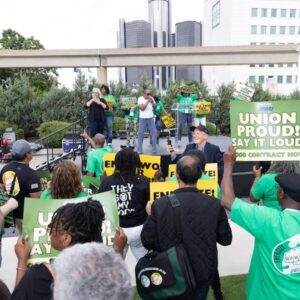March 3, 2026
Fighting Contract Postal Units; Protecting Retail Jobs
(This article by then-Executive Vice President Cliff Guffey appeared in the September/October 2009 issue of The American Postal Worker magazine.)
The USPS announcement [PDF] in May that more than 3,200 stations and branches in Level 24-and-above post offices would be evaluated for possible consolidation or closure has sparked great concern across the country.

Retail employees are understandably fearful that their jobs will be eliminated, and many union activists are convinced that management plans to replace the stations and branches with Contract Postal Units (CPUs), which are owned and run by non-postal employees.
To protect the retail jobs, we need a coordinated plan of attack. There are several elements to such a plan: A national-level grievance has been filed regarding plans to consolidate and close stations and branches; the union is participating in proceedings before the Postal Regulatory Commission on the subject, and many locals have already joined with community residents to voice opposition.
Another important element of our strategy must be to vigorously challenge illegitimate CPUs. Here are some important guidelines that will help locals determine whether CPUs in their areas violate the Collective Bargaining Agreement or USPS handbooks. If the CPUs are in violation, the union should demand that they be shut down. We also should demand compensation for work opportunities our members are denied. This will help to force currently subcontracted work back into the U.S. Postal Service system.
CPU Questions
To help decide whether a CPU has been properly established, locals should answer the following questions:
Q Does the CPU own its own facility?
A The AS 707F Handbook, Contracting for Contract Postal Units, states, “A contract postal unit is a contractor owned and operated facility, under contract to the Postal Service…”
While the AS 707F was never presented to the APWU as an official handbook, the APWU negotiated a Step 4 settlement, Q00C-4Q-C0610364 [PDF], which includes the same requirement.
Locals should review the contracts to see whether the CPU operator owns or leases the location. If not, the operation fails to meet the requirements of a Contract Postal Unit.
Q Does the Postal Service rent or own the property the CPU is operating on? In some cases, the Postal Service has hired contractors to supply labor to work in a property the USPS owns or leases, and has then identified the operation as a CPU.
A This is improper, because Article 1 of the Collective Bargaining Agreement stipulates that the APWU would have jurisdiction over such a facility. That means that the APWU would represent the workers, and the contract would have to be honored.
The same Step 4 settlement referenced in No. 1, above, says, “A contract postal unit may not be located on property which is owned or leased by the Postal Service.”
If the USPS rents or owns the property, the operation fails to meet the requirements of a Contract Postal Unit.
Q Does (or will) the CPU have a Post Office box section?
A Postal regulations stipulate that Post Office boxes may be located only in postal facilities. Even the new Postal Employee Guide to Contract Postal Units (Publication 156), which the union is challenging, states, at Section 1-5.7: “A CPU should not provide Post Office box service …”
A review of the contract or a site inspection will tell you whether Post Office box service is provided.
If PO box service is provided, the operation exceeds the authority of a Contract Postal Unit.
Q Does the business housing the CPU sell alcoholic beverages for consumption on the premises?
A In some parts of the country, gas stations and convenience stores are allowed to sell beer by the bottle that can be consumed on site.
Publication 156, Section 1-5.6.1, says: “The CPU must not be located in or directly connected to a room where intoxicating beverages are sold for consumption on premises.”
If the business sells alcoholic beverages for consumption on the premises, the operation fails to meet the requirements of a Contract Postal Unit.
Q Does the CPU also sell the products of competitors?
A The settlement cited in No.1, above, prohibits CPUs established after May 17, 2007, from selling competitors’ branded products, including those of UPS and FedEx, unless an exception has been granted by USPS headquarters.
If the CPU sells these items, the operation should be challenged.
Follow Up
Locals should review the contracts and operations of CPUs, and should determine who owns or leases the property where CPUs are located. If any aspect of the CPU operations violates the criteria above, the local should aggressively seek closure of the CPU. They should also get compensation for the work opportunities our members were denied. Locals should request a meeting on any possible local subcontracting, including new CPUs, in accordance with Article 17 and Article 32.
For more information on challenging CPUs, see the APWU Station & Branch Consolidation ‘Tool Kit’ [Members Only – PDF]
Farewell to a Friend
We were saddened to be informed of the passing in July of Tom Renshaw, long-time APWU activist and chairperson of several National Election Committees. Our condolences to his family and to the California Area Local APWU community.

